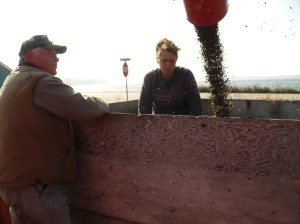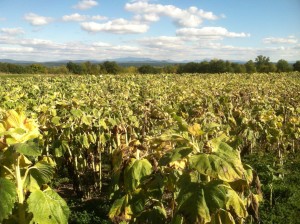Farm Fresh Fuel 2014
This guest post was contributed by Hannah Harwood and Dr. Heather Darby at UVM Extension Northwest Crops and Soils Program.
Travel Route 2 through Grand Isle County in early August this year and the rolling yellow fields along the roads will undoubtedly catch your eye. Sunflowers will be in bloom and, more than likely, tourists will be snapping photos. For the second year, growers throughout the county will be participating in a project that supports a small community of individuals who will be producing their own biofuels.
The Farm Fresh Fuel Project—created by UVM Extension’s Northwest Crops & Soils Program and the Vermont Bioenergy Initiative (VBI)—began in 2012 with about a dozen interested growers and 69 acres of sunflowers planted in the islands. Grand Isle County was chosen because it is a agriculturally-diverse community with some existing resources and experience in oilseed production. Participating growers, who signed up in each town in the county in 2012, ranged from seasoned dairy farmers to homesteaders trying their hand at crop production for the first time. All were grateful that the project was taking place in close proximity to technical assistance, equipment, and experienced growers.
That’s the whole idea of the Farm Fresh Fuel Project: developing a small community of individuals who can produce biofuels from the seed to the tank, in a place where the resources already exist to help along the way. Farm Fresh Fuel serves as a sort of small case study for alternative crops and small-scale biofuel production. If all Grand Isle County farmers integrated some amount of biodiesel into their operation, the county could be the first in the nation to have all of its agricultural producers using alternative energy.
Growers who want to participate in the project are responsible for providing the land, meeting fertility requirements, and arranging for planting, cultivation and harvest. In exchange, UVM Extension provides soil tests and interpretation, sunflower seed, technical crop production assistance, and in-season monitoring and insect scouting. After harvest, growers have the option of getting the seed processed at Borderview Farm in Alburgh, a facility with the on-site capacity to clean, dry, and press seed, as well as process raw oil into biodiesel.

Farm operator Roger Rainville and UVM Extension agronomist Heather Darby watch the sunflower seed flow out of the combine on West Shore Road in Alburgh, 2012. Credit: Hannah Harwood.
In 2012, the average sunflower seed yield was approximately 1400 lbs per acre, though the success of individual fields ranged drastically from one to the next. The most problematic obstacles for Grand Isle producers were birds and weeds, both of which are concerns for almost every oilseed grower in the Northeast. Overall, 28.3 tons of seed were harvested from the county, and Roger and Natasha Rainville at Borderview Farm pressed 2,750 gallons of oil for participating growers, enough to make 2150 gallons of biofuel. When the oil was pressed, what was left was 15.9 tons of sunflower meal—which some participants used to feed livestock or fertilize their vegetables, and some sold to other farmers in the county. Overall, there was a buzz of excitement about these new value-added products—oil, meal, and/or fuel—being produced right in the county.
Though there was increasing interest and an abundance of good intention in 2013, weather conditions in May and June (namely 6.9” of rain above standard 30-year averages) prevented most anticipated fields from being planted on time or at all. The fields that were successfully seeded had decent yields, but the project in general was delayed for a year, giving growers, processors, and weathermen a chance to regroup.
UVM Extension and VBI are excited to facilitate this project again in 2014, with renewed interest from 2012 growers as well as interest from farmers and landowners new to Farm Fresh Fuel. After hosting an informational meeting on March 27 and gauging interest, UVM Extension estimates that at least eight growers will participate this year, putting approximately 60 acres into oilseed crop production for fuel, feed, and fertilizer that’s grown right in their backyard. If the weather cooperates, planters will start rolling through fields in May, and little green sunflower shoots will be visible from the road by June.






